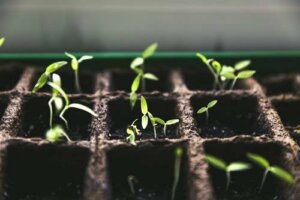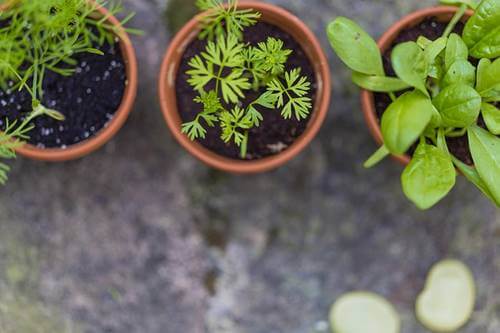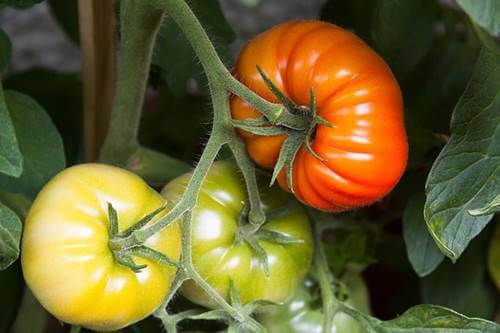Gardening At Home: More Than a Trend

It’s becoming more and more common for people to start gardening at home. Whether on terraces, balconies, or windowsills, people creating small gardens where their plants can grow. With care, interest, and patience, these plants can yield edible vegetables after months.
For many people, this is little more than a fad. You can see pictures on social networks of people showing off their small home gardens. These photos are so popular and show that you can make a garden with some small plants, compensating for lack of space with creativity and care.
However, for experts, this isn’t a matter of a trend. It’s also not just an attempt to do something creative when you have nothing else to do. In reality, gardening at home is a hobby that’s a reaction to one of our most basic needs: connecting with the Earth.
Gardening isn’t based on the fear of running out of food or a desperate attempt to become self-sufficient by growing garlic and tomatoes. Instead, it’s a return to nature and can help us find calmness and connect with something primary within ourselves.

Gardening at home: returning to nature
The poet Rabindranath Tagore used to say that people have a habit of mistreating the Earth and that she, in response, offers flowers. This might be so.
Now, something striking that many people are experiencing these days is an interest in returning to nature. Contact with soil is returning to what nourishes us, protects us, and, after all, gives us life.
Suddenly, having the time and maintaining a more leisurely, intimate rhythm often turns us towards introspection. This makes us curious about the Earth and to watch plants, seeds, flowers, and fruits grow.
Gardening at home isn’t just a simple trend for boring days. Many people are experiencing unusual benefits from this hobby.
Gardening as a way of connecting with ourselves
Sometimes, we need a space to feel good, think, and find peace in a difficult world that changes quickly.
We survive as best we can, but we also discover new things every day. Many people follow certain practices, while others rest to calm their anxiety. Other people choose to spend time gardening at home.
It’s interesting to know that gardening at home is a hobby that can help your mental health.
Jennifer Atkinson, a professor at the University of Washington, explains in her book Gardenland: Nature, Fantasy, and Everyday Practice that gardening helps manage stress, allows us to think about alternatives to problems, and also helps create a connection with our inner selves.
Cultivate a garden, not out of fear, but to enjoy contact with the Earth and watching plants grow
We mentioned at the beginning of this article that gardening at home isn’t something you should do in response to fear. Don’t be afraid of running out of food.
However, in times of crisis, gardening becomes a common practice. This is most likely an instinctual response to a crisis.
Now, regardless of whether someone is gardening out of necessity or not, there’s something undeniably beneficial about gardening. Sowing seeds, watching them grow, and harvesting fruits or vegetables over time is a very rewarding exercise. This has been true for a long time. Contact with the Earth returns us to the most primal human experience and can be very enjoyable.
There’s a sense of hope as you watch your plants grow, watch fruits appear, and eventually get to enjoy them.

Gardening at home, an alternative to electronic devices
Gardening at home is a break for your brain. Nowadays, we use technology for everything, as it’s very useful. Thanks to modern devices, we’re able to stay in constant contact with friends, family, and co-workers.
Our computers and phones will our hours and help bridge the gap with people who are far away. However, these devices can lead to a problem. When we hang up our phones or end a video call, we’re left with a feeling of emptiness.
You can fill the inexplicable emptiness with gardening. Cultivating is creating, reconnects you to the Earth, and helps teach you to care and be patient.
Days can even go by faster as you watch how the plant grows and unfolds its leaves or grows fruits of vegetables. Also, there’s nothing to lose by trying it out! You can immerse yourself in this ancient practice that goes so far beyond supplying and feeding.
It’s becoming more and more common for people to start gardening at home. Whether on terraces, balconies, or windowsills, people creating small gardens where their plants can grow. With care, interest, and patience, these plants can yield edible vegetables after months.
For many people, this is little more than a fad. You can see pictures on social networks of people showing off their small home gardens. These photos are so popular and show that you can make a garden with some small plants, compensating for lack of space with creativity and care.
However, for experts, this isn’t a matter of a trend. It’s also not just an attempt to do something creative when you have nothing else to do. In reality, gardening at home is a hobby that’s a reaction to one of our most basic needs: connecting with the Earth.
Gardening isn’t based on the fear of running out of food or a desperate attempt to become self-sufficient by growing garlic and tomatoes. Instead, it’s a return to nature and can help us find calmness and connect with something primary within ourselves.

Gardening at home: returning to nature
The poet Rabindranath Tagore used to say that people have a habit of mistreating the Earth and that she, in response, offers flowers. This might be so.
Now, something striking that many people are experiencing these days is an interest in returning to nature. Contact with soil is returning to what nourishes us, protects us, and, after all, gives us life.
Suddenly, having the time and maintaining a more leisurely, intimate rhythm often turns us towards introspection. This makes us curious about the Earth and to watch plants, seeds, flowers, and fruits grow.
Gardening at home isn’t just a simple trend for boring days. Many people are experiencing unusual benefits from this hobby.
Gardening as a way of connecting with ourselves
Sometimes, we need a space to feel good, think, and find peace in a difficult world that changes quickly.
We survive as best we can, but we also discover new things every day. Many people follow certain practices, while others rest to calm their anxiety. Other people choose to spend time gardening at home.
It’s interesting to know that gardening at home is a hobby that can help your mental health.
Jennifer Atkinson, a professor at the University of Washington, explains in her book Gardenland: Nature, Fantasy, and Everyday Practice that gardening helps manage stress, allows us to think about alternatives to problems, and also helps create a connection with our inner selves.
Cultivate a garden, not out of fear, but to enjoy contact with the Earth and watching plants grow
We mentioned at the beginning of this article that gardening at home isn’t something you should do in response to fear. Don’t be afraid of running out of food.
However, in times of crisis, gardening becomes a common practice. This is most likely an instinctual response to a crisis.
Now, regardless of whether someone is gardening out of necessity or not, there’s something undeniably beneficial about gardening. Sowing seeds, watching them grow, and harvesting fruits or vegetables over time is a very rewarding exercise. This has been true for a long time. Contact with the Earth returns us to the most primal human experience and can be very enjoyable.
There’s a sense of hope as you watch your plants grow, watch fruits appear, and eventually get to enjoy them.

Gardening at home, an alternative to electronic devices
Gardening at home is a break for your brain. Nowadays, we use technology for everything, as it’s very useful. Thanks to modern devices, we’re able to stay in constant contact with friends, family, and co-workers.
Our computers and phones will our hours and help bridge the gap with people who are far away. However, these devices can lead to a problem. When we hang up our phones or end a video call, we’re left with a feeling of emptiness.
You can fill the inexplicable emptiness with gardening. Cultivating is creating, reconnects you to the Earth, and helps teach you to care and be patient.
Days can even go by faster as you watch how the plant grows and unfolds its leaves or grows fruits of vegetables. Also, there’s nothing to lose by trying it out! You can immerse yourself in this ancient practice that goes so far beyond supplying and feeding.
This text is provided for informational purposes only and does not replace consultation with a professional. If in doubt, consult your specialist.







